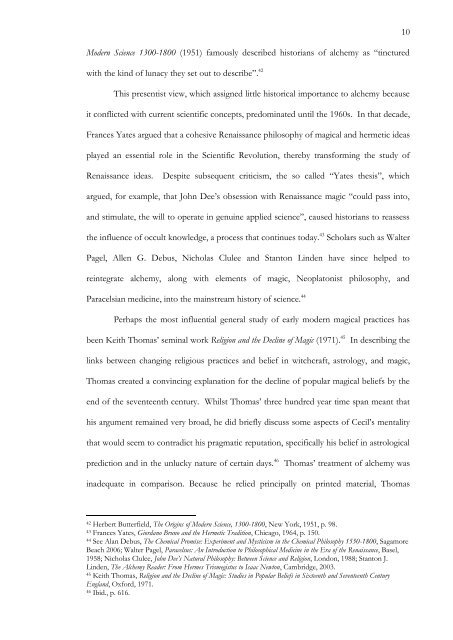The Alchemical Patronage of Sir William Cecil, Lord Burghley
The Alchemical Patronage of Sir William Cecil, Lord Burghley
The Alchemical Patronage of Sir William Cecil, Lord Burghley
Create successful ePaper yourself
Turn your PDF publications into a flip-book with our unique Google optimized e-Paper software.
Modern Science 1300-1800 (1951) famously described historians <strong>of</strong> alchemy as ―tinctured<br />
with the kind <strong>of</strong> lunacy they set out to describe‖. 42<br />
This presentist view, which assigned little historical importance to alchemy because<br />
it conflicted with current scientific concepts, predominated until the 1960s. In that decade,<br />
Frances Yates argued that a cohesive Renaissance philosophy <strong>of</strong> magical and hermetic ideas<br />
played an essential role in the Scientific Revolution, thereby transforming the study <strong>of</strong><br />
Renaissance ideas. Despite subsequent criticism, the so called ―Yates thesis‖, which<br />
argued, for example, that John Dee‘s obsession with Renaissance magic ―could pass into,<br />
and stimulate, the will to operate in genuine applied science‖, caused historians to reassess<br />
the influence <strong>of</strong> occult knowledge, a process that continues today. 43 Scholars such as Walter<br />
Pagel, Allen G. Debus, Nicholas Clulee and Stanton Linden have since helped to<br />
reintegrate alchemy, along with elements <strong>of</strong> magic, Neoplatonist philosophy, and<br />
Paracelsian medicine, into the mainstream history <strong>of</strong> science. 44<br />
Perhaps the most influential general study <strong>of</strong> early modern magical practices has<br />
been Keith Thomas‘ seminal work Religion and the Decline <strong>of</strong> Magic (1971). 45 In describing the<br />
links between changing religious practices and belief in witchcraft, astrology, and magic,<br />
Thomas created a convincing explanation for the decline <strong>of</strong> popular magical beliefs by the<br />
end <strong>of</strong> the seventeenth century. Whilst Thomas‘ three hundred year time span meant that<br />
his argument remained very broad, he did briefly discuss some aspects <strong>of</strong> <strong>Cecil</strong>‘s mentality<br />
that would seem to contradict his pragmatic reputation, specifically his belief in astrological<br />
prediction and in the unlucky nature <strong>of</strong> certain days. 46 Thomas‘ treatment <strong>of</strong> alchemy was<br />
inadequate in comparison. Because he relied principally on printed material, Thomas<br />
42 Herbert Butterfield, <strong>The</strong> Origins <strong>of</strong> Modern Science, 1300-1800, New York, 1951, p. 98.<br />
43 Frances Yates, Giordano Bruno and the Hermetic Tradition, Chicago, 1964, p. 150.<br />
44 See Alan Debus, <strong>The</strong> Chemical Promise: Experiment and Mysticism in the Chemical Philosophy 1550-1800, Sagamore<br />
Beach 2006; Walter Pagel, Paracelsus: An Introduction to Philosophical Medicine in the Era <strong>of</strong> the Renaissance, Basel,<br />
1958; Nicholas Clulee, John Dee’s Natural Philosophy: Between Science and Religion, London, 1988; Stanton J.<br />
Linden, <strong>The</strong> Alchemy Reader: From Hermes Trismegistus to Isaac Newton, Cambridge, 2003.<br />
45 Keith Thomas, Religion and the Decline <strong>of</strong> Magic: Studies in Popular Beliefs in Sixteenth and Seventeenth Century<br />
England, Oxford, 1971.<br />
46 Ibid., p. 616.<br />
10















